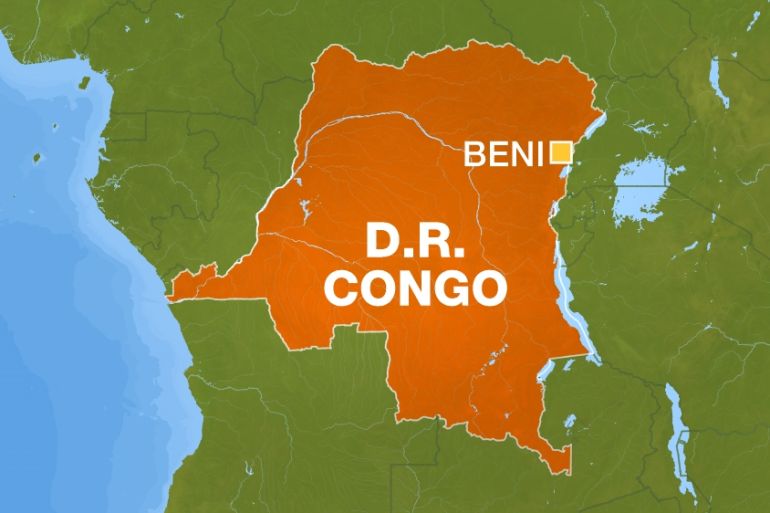Seven UN peacekeepers killed in fight against DRC rebels
Several DRC soldiers also killed or wounded in joint operation targeting Allied Democratic Forces fighters in northeast.

The United Nations says seven of its peacekeepers have been killed in the Democratic Republic of Congo (DRC), in a military operation with government forces against rebels in the country’s Ebola-hit northeast.
Several DRC soldiers were also killed or wounded in Wednesday’s joint operation targeting Allied Democratic Forces (ADF) rebels in the Beni region, North Kivu, according to Stephane Dujarric, UN spokesperson.
Ten UN peacekeepers were wounded and one was still missing, he added. An unknown number of ADF fighters were also killed or wounded.
Dujarric said six of the killed peacekeepers were from Malawi and one was from Tanzania.
The DRC’s volatile east is home to many armed groups, including ADF, vying for control of the mineral-rich region.
The ADF originated in Uganda as a rebel force against the government and carried out deadly bombings in the 1990s. A military campaign forced them to relocate to eastern DRC.
![The WHO has been reaching out to mothers to address the Ebola outbreak crisis [WHO/Junior Kannah/Handout via Reuters]](/wp-content/uploads/2018/11/d8d77b1017724ef1a115b3b4ca778b27_18.jpeg)
Since October 2014, ADF rebels have been accused of killing more than 1,500 people in the Beni region.
UN investigators have blamed the ADF for carrying out the deadliest single assault on the UN peacekeeping mission in the DRC in almost 25 years.
That attack on December 7, 2017 at a base in Semuliki near Beni killed at least 15 Tanzanian peacekeepers, wounded 43 others and left one peacekeeper missing.
In recent attacks, ADF rebels have also killed civilians and abducted children in the Beni region.
The rebel attacks have forced suspension of crucial efforts to contain the Ebola outbreak in some areas.
Peter Salama, the emergencies chief for the World Health Organization, predicted earlier this week that the outbreak, which has killed more than 200 people, would last at least another six months.
He said makeshift health facilities offering both traditional and modern treatment have become “major drivers” of the current, deadly transmission and are believed to be linked to more than half of the cases in Beni, the largest city affected by the current outbreak.
Salama said the current Ebola outbreak is “arguably the most difficult context that we’ve ever encountered”, pointing to activities of two armed rebel groups in the region.
UN Secretary-General Antonio Guterres called on all armed groups to stop “their destabilising activities” and “disarm immediately”, Dujarric said.
He also urged DRC authorities to apprehend and bring to justice the perpetrators of attacks against civilians, national security forces and UN peacekeepers, the spokesperson added.
Guterres gave strong backing to peacekeepers from Malawi and Tanzania “who continue to operate in an exceptionally difficult environment to protect local populations against the attacks of the ADF and other armed groups,” Dujarric said.